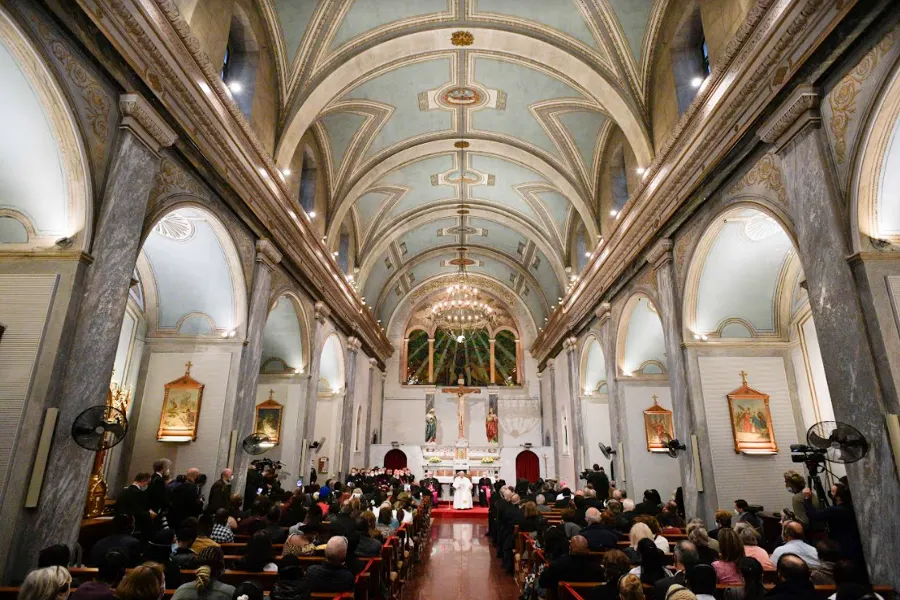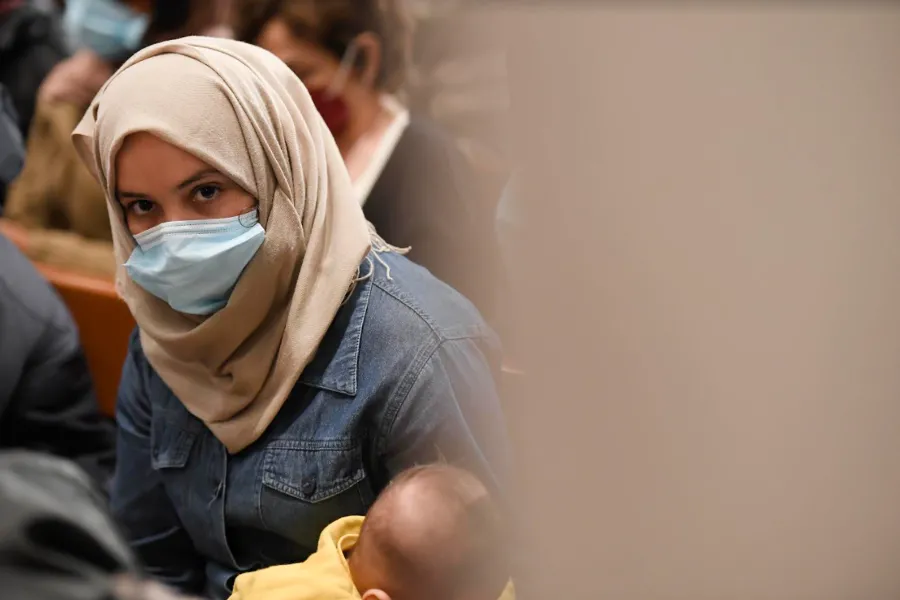
Rome Newsroom, Dec 3, 2021 / 09:00 am (CNA).
Pope Francis spent time in prayer Friday with migrants on the island of Cyprus, which currently receives more asylum seekers per capita than any other country in the European Union.
As the pope met with the migrants, the Vatican announced Dec. 3 that it had helped to arrange the transfer of 12 refugees from Cyprus to Italy via an agreement between the Vatican Secretary of State with the Cypriot and Italian authorities.

The pope was welcomed to the Church of the Holy Cross in the divided capital of Nicosia by Patriarch Pierbattista Pizzaballa, the Latin Patriarch of Jerusalem.
“Cyprus, first among the islands of the Mediterranean, experiences the tragedy of thousands of migrants, fleeing war and misery and who stop here, with no way out, with no clear prospects for their future,” Pizzaballa said.
“It was right and proper, before ending your pilgrimage, to turn your gaze also to that painful and difficult reality that exists on this island, in which the dramas that the Mediterranean experiences every day are symbolically presented,” he added.

Four migrants, from Iraq, Cameroon, Sri Lanka, and the Democratic Republic of the Congo, shared their testimonies with the pope.
In his testimony, Rozh Najeeb from Iraq said: “I am someone who is on a journey. I have had to run away from violence, bombs, knives, hunger, and pain. I have been forced along dusty roads, pushed into trucks, hidden in the trunks of cars, thrown into leaking boats — deceived, exploited, forgotten, denied. I was forced on my journey.”

“Yet my journey has also been towards something. I journey every day, anxious to reach a new destination. A place of safety and health, a place that affords liberties and choices, a place where I can give and receive love, a place where I can practice my faith and my customs proudly, sharing them with others, a place where I can dare to hope,” he said.

Thamara da Silva from Sri Lanka said that each time she has to fill out migration paperwork, she must reduce her identity into “a check mark next to a box on a form.”
“I have to use a word or two to explain myself to one of the few who might choose to ask or to acknowledge that I am even here. What do I say? Usually, I must choose ‘xenos,’ foreigner, victim, asylum seeker, refugee, migrant, other, but what I want to scream is ‘person,’ sister, friend, believer, neighbor,” she said.
Pope Francis thanked the young people for sharing their testimonies, which he said were “like a mirror held up to us, to our Christian communities.”

“It is he, the Lord Jesus, whom we encounter in the faces of our marginalized and discarded brothers and sisters. In the face of the migrant who is despised, rejected, put in a cage,” Pope Francis said.
“But at the same time — as you said — the face of the migrant journeying to a goal, to a hope, to greater human companionship.”

The live-streamed ecumenical prayer with migrants was Pope Francis’ last public event in Cyprus before he heads to Greece on Saturday morning.
Over the weekend, the pope will meet Greek Orthodox Archbishop Ieronymos II in Athens and visit refugees on the Greek island of Lesbos.
At the end of his speech, Pope Francis said that he had the image of barbed wire in his heart after seeing how it divides Nicosia amid the “war of hatred that the country experiences.”

“Barbed wires in other areas are in place to not let refugees in. The one who comes to ask for freedom, bread, help, brotherhood, joy, who is fleeing from hatred, finds before him a hatred called barbed wire,” the pope said.
“May the Lord awaken the conscience of all of us before these things. And excuse me if I have said things … but we cannot remain silent.”
If you value the news and views Catholic World Report provides, please consider donating to support our efforts. Your contribution will help us continue to make CWR available to all readers worldwide for free, without a subscription. Thank you for your generosity!
Click here for more information on donating to CWR. Click here to sign up for our newsletter.




Leave a Reply